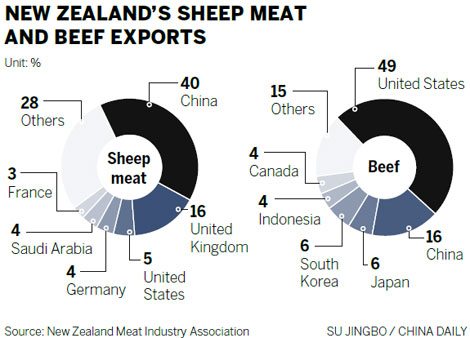Demand rising for quality meat from New Zealand
By Wang Zhuoqiong and Zhong Nan (China Daily) Updated: 2014-11-27 10:10
A growing appetite for red meat in China has made the country the largest market for sheep meat exports, and the second-largest for beef exports from New Zealand.
Tim Ritchie, chief executive of the Meat Industry Association of New Zealand, said on Tuesday that demand for quality meat has evolved so rapidly over the last few years that many New Zealand exporters are finding it hard to keep up with demand from China.
|
|
Demand for other meat items, mainly used in Chinese cooking such as in hotpots, is also on the rise, he said, but significantly rising incomes mean more customers are spending on packaged meat particularly, for home use and by restaurants and hotels.
Speaking in Beijing, Ritchie said 92 percent of all sheep meat and 83 percent of the beef that New Zealand produces is now being exported.
China is the largest export destination for New Zealand's sheep meat (40 percent of total volume) and the second-largest export destination for its beef (16 percent) after the United States which takes just under half.
Over the past decade, annual sheep meat exports to China have risen from 27,000 metric tons to more than 160,000 tons, and beef from 1,000 tons to 37,000 tons.
China is also the largest customer for New Zealand-exported halal-certified meat, taking a dominant 28 percent share of exports, according to figures recorded in September 2013.
"Fueled by the 2008 New Zealand-China Free Trade Agreement, Chinese trade has grown at an unprecedented speed. Demand for imported meat in China will continue to rise," he said.
Ben Cavender, principal at the China Market Research Group, said concern over food safety is the main reason for the rising demand for imported meat in China.
Also as incomes rise, he said, consumers are eating more meat and are trying different types of cuisine.
"Twenty years ago it would have been difficult for the average family to regularly afford beef. But there are enough middle-class consumers now that this is becoming more of a regular purchase," he said.
Gerard Morrison, managing director of shipping company Maersk Line New Zealand, said that since 2005, the company's meat shipments to China have grown by 500 percent.
"The increase in trade between New Zealand and China has been massive," said Morrison.
Murray Brown, general manager of marketing at Alliance Group Ltd, a New Zealand-based, farmer-owned co-operative and one of the world's largest processors of sheep meat, said that sales of chilled meat will continue to surge as China's middle class becomes more sophisticated in its shopping habits, and is willing to pay a premium for quality.
"Right now most of our Chinese exports involve high-value frozen meat. China is a volume market at the moment. The next aspiration for this trade is probably to look for value such as chilled lamb," said Brown, adding that Chinese regulatory authorities will have to allow chilled meat imports.
- Cash crunch fans expectation on RRR cut
- US extends antidumping duties on China's thermal paper
- Modern food van with ancient look in Shanghai
- China home prices continue to cool in November
- Asia's top 3 billionaires all Chinese
- Old investment remedy the treatment for China's "new normal"
- China's solar sector opposes US anti-dumping ruling
- BMW to recall 846 cars in China

















